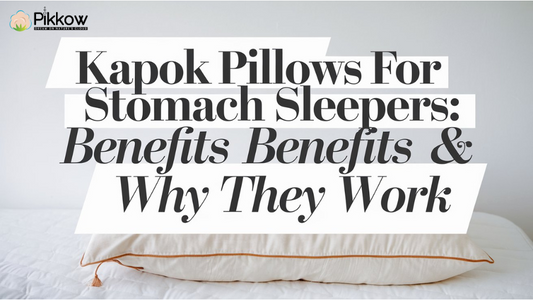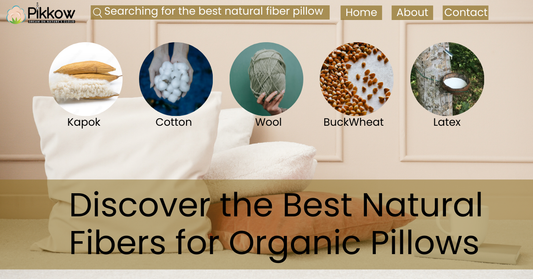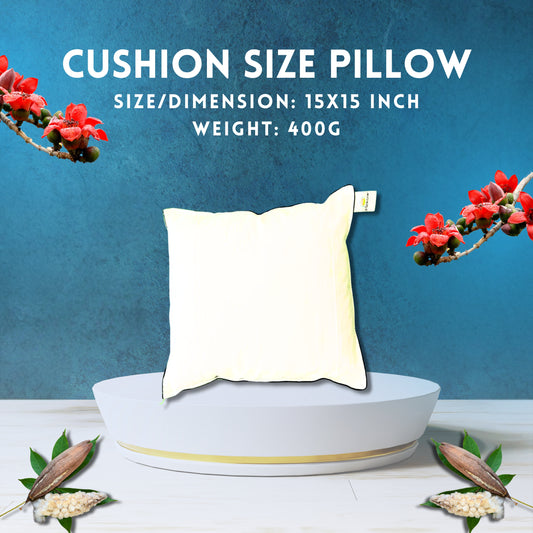Sleep is essential for our overall well-being, but did you know the type of pillow you use could impact your health? Many people unknowingly sleep on polyester-filled pillows, unaware of the potential risks. This brings up a crucial question: is polyester pillow filling toxic? If you’ve been wondering about the safety of your pillows and whether switching to organic options is worth it, you’re in the right place. This blog will explore the concerns surrounding polyester pillow filling and why organic pillows are the healthier choice for better sleep and a better planet.
Understanding Polyester Pillow Filling
Polyester pillow filling is made from synthetic fibers, typically derived from petroleum-based products. These fibers are lightweight, inexpensive, and commonly used in bedding. While polyester pillows are popular due to their affordability and softness, the materials used in their production have raised concerns over time.
How Polyester is Made
Polyester is created through a chemical process involving petroleum, coal, air, and water. The production results in a fiber that is durable but far from natural. It’s important to note that this process includes the use of potentially harmful chemicals that may linger in the final product.
What Makes Polyester Potentially Toxic?
So, is polyester pillow filling toxic? The concern arises from the chemicals used during production, which can release harmful volatile organic compounds (VOCs). VOCs are chemical gases that can affect indoor air quality and potentially lead to health issues over time.
Health Risks of Polyester Pillow Filling
The question is polyester pillow filling toxic, often stems from worries about how these pillows might affect our health. Here’s a closer look at some potential risks associated with polyester pillow filling:
1. Exposure to Harmful VOCs
Polyester-filled pillows can emit VOCs such as formaldehyde, a known irritant. Prolonged exposure to VOCs has been linked to symptoms like headaches, dizziness, and respiratory issues. This is particularly worrying for individuals with allergies, asthma, or chemical sensitivities.
2. Skin Irritation
The synthetic nature of polyester can sometimes cause skin irritation, especially for people with sensitive skin. Unlike organic materials, polyester does not breathe well, which can trap heat and moisture, potentially leading to discomfort or rashes.
3. Poor Temperature Regulation
Polyester pillows often lack the breathability of natural materials. As a result, they can trap heat, causing discomfort and disrupting sleep. For hot sleepers, this can make a significant difference in sleep quality.
4. Environmental Impact
While not a direct health risk, polyester production has a significant environmental impact. It depends on non-renewable replacement and contributes to plastic pollution. Choosing organic options helps minimize this footprint while promoting sustainable practices.
Why Organic Pillows are the Healthy Choice
Now that we’ve addressed is polyester pillow filling toxic, let’s shift the focus to the benefits of organic pillows. These natural alternatives are free from synthetic materials and harmful chemicals, making them a safer and healthier option.
1. Made from Natural Materials
Organic pillows are crafted from materials like organic cotton, wool, latex, or kapok. These materials are not only sustainable but also free from pesticides, synthetic dyes, and toxic chemicals.
2. Hypoallergenic Benefits
Unlike polyester, organic pillows are naturally hypoallergenic. They resist dust mites, mold, and mildew, making them ideal for individuals with allergies or sensitive respiratory systems.
3. Better Temperature Regulation
Organic pillows are more breathable than polyester options. They wick away moisture and regulate temperature, ensuring a cool and comfortable sleep environment. This feature is particularly beneficial for those who sleep hot or live in warmer climates.
4. Chemical-Free Sleep
With organic pillows, you can rest assured that you’re not inhaling harmful VOCs or chemicals. This creates a healthier sleep environment, especially for children, pregnant women, or individuals with sensitivities.
5. Long-Lasting Durability
Organic pillows are often more durable than their synthetic counterparts. While they may come with a higher upfront cost, their longevity makes them a worthwhile investment in the long run.
Comparing Polyester and Organic Pillow Fillings
To fully understand the difference, let’s compare polyester and organic pillow fillings in terms of health, comfort, and environmental impact.
|
Feature |
Polyester Pillow Filling |
Organic Pillow Filling |
|
Toxicity |
May emit VOCs and harmful chemicals |
Free from synthetic chemicals |
|
Breathability |
Poor |
Excellent |
|
Allergen Resistance |
Low |
High |
|
Environmental Impact |
Non-sustainable, high carbon footprint |
Eco-friendly and renewable |
|
Durability |
Short lifespan, prone to clumping |
Long-lasting and maintains shape |
How to Choose the Best Organic Pillow
Switching to organic pillows is a step toward healthier sleep, but how do you choose the best one? Here are some tips to guide you:
1. Check for Certifications
Look for certifications like GOTS (Global Organic Textile Standard) or GOLS (Global Organic Latex Standard) to ensure the pillow meets organic standards.
2. Consider Your Sleeping Position
Different sleeping positions require different levels of support. For instance:
- Back sleepers need medium firmness for neck alignment.
- Side sleepers benefit from firmer pillows to fill the gap between their head and shoulders.
- Stomach sleepers prefer softer, thinner pillows.
3. Know Your Preferred Material
Each organic material has its unique benefits:
- Kapok: Soft and fluffy, resembling down.
- Latex: Firm and supportive, great for neck alignment.
- Wool: Temperature-regulating and naturally resistant to dust mites.
- Cotton: Lightweight and breathable.
4. Test for Comfort
Whenever possible, test the pillow for comfort. Many brands offer trial periods to ensure you find the perfect match.
Conclusion
So, is polyester pillow filling toxic? While it’s not overtly dangerous in the short term, the potential health risks, combined with its environmental impact, make it worth reconsidering. Organic pillows offer a safer, more sustainable alternative, free from harmful chemicals and synthetic materials. They not only improve your sleep quality but also contribute to a healthier planet.
Switching to organic pillows with pillow is a small change that can have a big impact. It’s time to prioritize your health and comfort by making an eco-friendly choice. Say goodbye to synthetic fillers and hello to restful, worry-free sleep with organic options.
FAQs
1. Is polyester pillow filling toxic for children?
Yes, children are more sensitive to VOCs emitted by polyester pillows. Organic pillows are a safer choice for their delicate systems.
2. How do I know if my pillow contains harmful chemicals?
Check the label for materials and certifications. If it’s made from polyester or lacks organic certifications, it may contain chemicals.
3. Are organic pillows expensive?
Organic pillows are often pricier upfront but last longer, making them a cost-effective investment in the long term.
4. How can I care for my organic pillow?
Follow the manufacturer’s instructions, which often include spot cleaning and airing out regularly to maintain freshness.
5. What is the best organic pillow filling for hot sleepers?
Kapok and wool are excellent options for hot sleepers due to their superior breathability and moisture-wicking properties.











